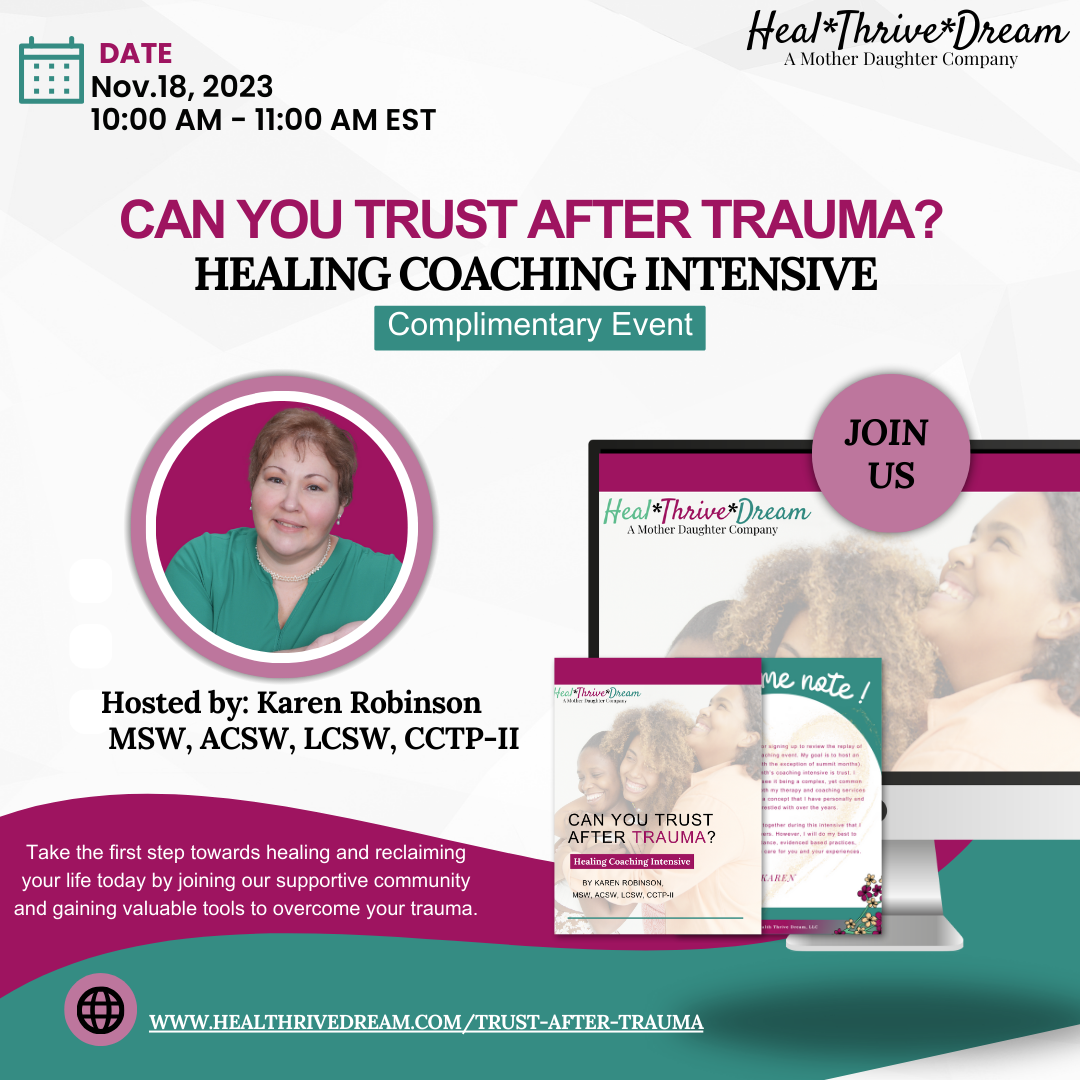If you are a trauma survivor or someone who has been deeply wounded by a betrayal, I know you are familiar with that awful feeling when your heart shatters, when it is difficult to breathe, and your stomach is turning inside out. Betrayal can shatter the trust you place in others, leaving you with a wounded heart and a deep sense of pain. In this blog post, I will explore the possibility of healing your heart after trust has been betrayed. It is my goal to offer some hope for your healing journey.

Complementary healing coaching intensive: Can you trust after trauma?
First, I encourage you to acknowledge your pain and allow yourself to feel all the emotions that come up. Denying your feelings existence will not make them go away. It is normal to grieve when your trust has been violated. Allow yourself to sit and not avoid your emotions. You will likely feel a myriad of emotions to include anger, depression, frustration, and confusion. Not allowing yourself to feel leads to stuffing them away which can lead to maladaptive coping mechanisms. I’m guessing you know that your maladaptive coping means overeating, overspending, overdoing, overdrinking. . . you get the picture.
Next, I recommend that you seek support. If you don’t have a close friend or family member that you can trust to turn to in confidence, reach out to a therapist. It is therapeutic to seek emotional support and guidance. You don’t have to heal alone. Sorting out the impact this betrayal had on your thoughts, feelings, and actions is important. Your therapist or coach can empower you to increase yourself awareness and help you set clearer boundaries moving forward. A therapist will guide you on how to set up boundaries you feel comfortable with in all of your relationships.
What is really important is deep self-care. This is more than a bubble bath and a cup of tea. Although those things are also great and can be a part of the self-care process; deeper self-care is feeding your mind, body, and spirit. Meditation, prayer, moving your body, nutrition, and journaling can all be self-care habits that will serve you will if you commit to a daily practice.
If the thought of this doesn’t make your skin boil, practice forgiveness. Remember you never have to condone the actions taken against you. It's about releasing the burden of anger and resentment from your heart. Forgiveness is a gift you give to yourself. It allows you an opportunity to grow in your personal development. Learning and growing means looking to see if there is anything you can do next time to avoid getting hurt (abuse or violence is never your fault).
You may be like me and experience heartburn when thinking about forgiving someone who has hurt you but remember that forgiveness also empowers you to rebuild trust within yourself. It builds your self-confidence and allows you to take more steps forward in your healing goals. While re-evaluating your self-care or healing goals, please take time to take a closer look at your relationships. Are there patterns of betrayal or toxicity? Consider whether certain relationships need to be reevaluated or even ended for your well-being.
If possible, seek closure with the person who betrayed your trust. This may involve a conversation or a letter expressing your feelings and thoughts. Closure can help you move forward. Healing takes time. Be patient with yourself and the process. Understand that the path to recovery is not linear, and there may be setbacks along the way. It is easier to embrace all the work needed to take care of yourself, but please embrace hope. Remember that healing is possible. Many have successfully healed their hearts after trust betrayal and gone on to rebuild trust in others. Embrace hope as a driving force in your journey. This can be possible for you too.
In conclusion, healing your heart after trust betrayal is a challenging but doable. It involves acknowledging your pain, allowing yourself to feel, seeking support, setting boundaries, practicing self-care, and embracing forgiveness and personal growth. Remember that healing takes time, and it's okay to seek professional help if needed. Please consider attending my intensive coaching session to learn more: https://www.healthrivedream.com/trust-after-trauma/



It's a process that requires courage, self-love, and a deep understanding of one's worth. Trust betrayal can leave deep wounds that take time to heal, but through therapy and self-care, it is possible to rebuild trust in oneself and others. In my narcissistic recovery therapy, I learned the importance of setting boundaries and prioritizing my well-being. It was a challenging but transformative journey that allowed me to let go of toxic relationships and rediscover my sense of self-worth. Through therapy, I gained valuable tools to navigate difficult emotions and cultivate healthier relationships based on trust and mutual respect. Healing from trust betrayal is a gradual process, but with patience and support, it is possible to emerge stronger and more resilient than ever before.
Thank you Margie for sharing your comments! I loved how you stated that letting go of toxic relationships aided you in rediscovering your self-worth!